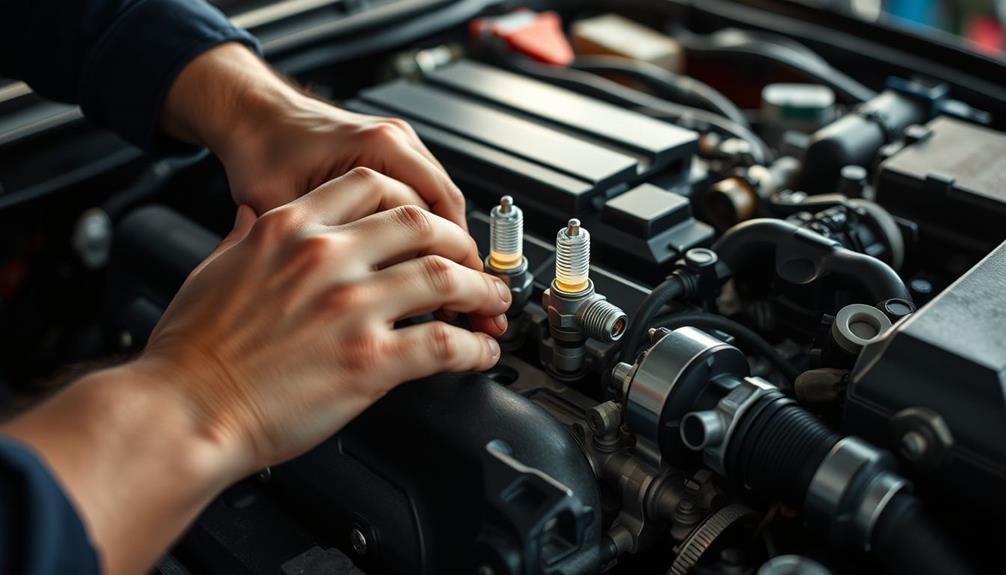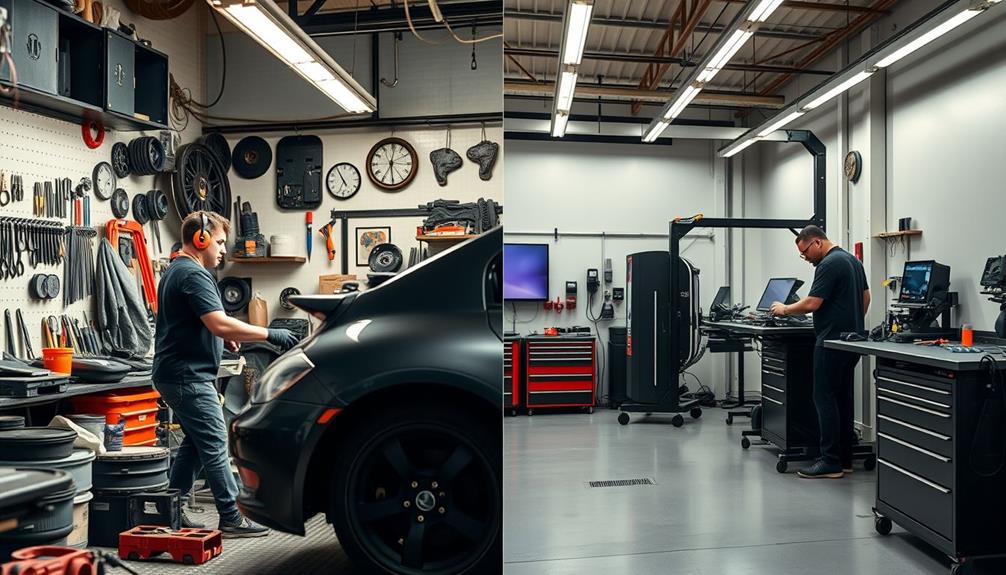Car tuning allows you to enhance your vehicle's performance, efficiency, and appearance by modifying components beyond factory settings. You can boost horsepower with ECU remapping and improve handling with suspension upgrades. Tuning can also optimize your fuel efficiency, potentially saving you money at the pump. While the benefits are appealing, be aware of risks like voiding warranties and potential legal issues. Professional tuning offers precision and compliance with regulations, ensuring you get the most out of your modifications. There's a lot more to evaluate regarding tuning and its impact on your vehicle, so keep exploring these essential aspects.
Key Takeaways
- Car tuning enhances vehicle performance by increasing horsepower and torque, potentially improving output by up to 30%.
- Modifications like ECU remapping and cold air intakes optimize fuel efficiency, potentially saving 10-20% on fuel costs.
- Suspension enhancements improve handling and stability, resulting in better cornering and driving responsiveness.
- Aesthetic modifications allow for personal expression, improving the vehicle's visual appeal while potentially increasing resale value.
- Legal compliance is crucial, as improper tuning can lead to fines and voided warranties, impacting vehicle ownership.
Definition of Car Tuning
Car tuning, at its core, is all about modifying your vehicle's performance, appearance, or handling beyond what the factory intended. When you engage in car tuning, you're looking to enhance various aspects of your ride. The primary goals often include boosting engine power, improving handling, and elevating aesthetics, allowing you to tailor your vehicle to your specific driving preferences.
Common modifications include ECU remapping, which optimizes your car's engine performance by adjusting fuel and ignition maps. Upgrading air intake systems and altering exhaust setups can also greatly enhance engine power and fuel efficiency, potentially increasing it by 10-20%.
On the handling side, enhancing your suspension can improve cornering stability and overall driving experience, making your car feel more responsive on the road.
Additionally, some enthusiasts focus on aesthetic tuning, which involves visual modifications that reflect personal style. Drivetrain tuning may also come into play, ensuring better power delivery and grip.
While car tuning can provide thrilling benefits, it's crucial to reflect on safety, legal compliance, and the potential impact on your vehicle's warranty before making any changes.
Key Components of Tuning

Tuning a vehicle involves several key components that can drastically enhance performance and driving experience. By focusing on specific modifications, you can reveal your car's true potential.
| Component | Description | Benefits |
|---|---|---|
| Engine Modifications | Upgrading air filters, turbochargers, and ECU remapping | Increases horsepower and torque by up to 30% |
| Suspension Enhancements | Installing performance springs and upgraded shocks | Improves handling and stability |
| Brake System Upgrades | Adding high-performance brake pads and discs | Guarantees better stopping power and responsiveness |
You'll find that exhaust system modifications can also notably improve engine efficiency and sound. Quicker exhaust gas exit enhances horsepower, making your ride feel more lively. On top of that, weight reduction techniques, such as using lightweight materials for wheels and body panels, can dramatically boost agility and acceleration.
Benefits of Vehicle Tuning

When you tune your vehicle, you can considerably boost its performance metrics, making every drive more exhilarating.
You'll also have the chance to customize its look, giving your car a unique edge while potentially improving aerodynamics.
Plus, with optimized fuel efficiency, you can save money at the pump without sacrificing power or style.
Enhanced Performance Metrics
Up to 30% more horsepower is just one of the exciting benefits you can gain from vehicle tuning. By utilizing modifications like ECU remapping and turbocharging, you can considerably boost engine performance, enhancing your vehicle's acceleration and overall efficiency.
Not only will you feel the difference in power, but you'll also experience enhanced throttle response, making every drive more engaging.
Tuning can improve fuel consumption too, potentially saving you 10-20% on fuel costs. This means your vehicle becomes more efficient over time, allowing you to enjoy the added power without breaking the bank at the pump.
Suspension tuning is another critical aspect that can lower your vehicle's center of gravity, improving stability and cornering performance. This is especially beneficial for sports cars and track vehicles, where better handling is essential for an exhilarating driving experience.
Well-executed tuning not only enhances your vehicle's performance metrics but can also increase its resale value. Enthusiasts often seek out vehicles with performance enhancements, making your tuned car more appealing in the market.
Aesthetic Customization Options
A multitude of aesthetic customization options awaits car enthusiasts looking to personalize their vehicles. From body kits to unique paint jobs, these modifications allow you to express your style and stand out on the road.
Adding enhancements like spoilers and side skirts not only improves visual appeal but also promotes better aerodynamics, which can enhance overall performance. Furthermore, just as the role of color accuracy in home cinema projectors influences the viewing experience, the right color scheme for your vehicle can greatly impact its aesthetic allure.
High-quality rims are another popular choice among tuners, dramatically altering your vehicle's appearance while improving handling and grip.
If you're keen on lighting, LED lighting upgrades provide a range of options for your headlights and taillights, enhancing both the look of your vehicle and nighttime visibility for safety.
Don't overlook the interior; custom interior modifications such as upgraded seats and dashboard designs can create a more personalized driving experience.
These enhancements increase comfort and convenience for both you and your passengers, turning each journey into a more enjoyable experience.
Embracing these aesthetic customization options not only showcases your personality but also transforms your vehicle into a true reflection of your taste and style.
Improved Fuel Efficiency
Vehicle tuning offers significant benefits, particularly regarding improved fuel efficiency. By optimizing fuel delivery and ignition timing, you can save 10-20% on fuel consumption after modifications, depending on the tuning techniques used.
ECU remapping and cold air intake systems are fundamental for enhancing engine efficiency, allowing your engine to burn fuel more effectively and utilize power more efficiently.
Moreover, tuning your vehicle can enhance aerodynamics through body modifications, reducing drag during highway driving. This improvement in aerodynamics contributes directly to better fuel economy.
Upgrading to high-performance exhaust systems also plays a key role; these systems facilitate quicker exhaust gas exit, leading to improved performance and, subsequently, better fuel efficiency.
Another essential aspect of tuning is weight reduction. By utilizing lightweight materials, you not only enhance your vehicle's performance but also lessen the engine's workload.
This reduction results in improved fuel efficiency, allowing you to get more miles per gallon.
Risks and Disadvantages

Often, car tuning can lead to significant risks and disadvantages that every enthusiast should consider. While tuning can enhance performance, it comes with potential drawbacks that may impact your vehicle in the long run.
| Risk | Description |
|---|---|
| Warranty Void | Tuning can void your manufacturer's warranty, leaving you responsible for repairs. |
| Increased Wear and Tear | Modifications may accelerate wear and tear on engine components, shortening engine lifespan. |
| Lower Resale Value | Tuned vehicles often have a decreased resale value due to limited buyer interest. |
| Emissions Compliance | Some modifications can increase emissions, risking fines for non-compliance with legal standards. |
You might also face higher maintenance costs and frequency, as modified vehicles often require more regular checks and repairs. This can add up quickly, making your car not just a hobby but a financial burden. Before you commit to tuning, weigh these risks against the benefits to ascertain you're making an informed decision. Remember, while tuning can offer thrills, it can also lead to costly pitfalls.
DIY Vs. Professional Tuning

When it comes to tuning your car, you'll face the choice between DIY and professional services. DIY tuning can be a thrilling experience, allowing you to personally modify your vehicle. However, it requires a solid grasp of automotive mechanics and access to the right tools. Without this knowledge, you might end up making costly mistakes that could affect your vehicle performance.
On the other hand, professional tuning offers expert adjustments that guarantee compliance with safety and legal standards. This greatly reduces the risk of engine damage or legal issues from improper modifications.
Professional tuners utilize advanced technology and software, providing more precise tuning that enhances your vehicle's performance.
While DIY tuning may seem cheaper upfront, consider the potential expenses from mistakes. Plus, professional tuners often provide warranties on their services and parts, giving you peace of mind.
DIY projects can void existing warranties, leaving you responsible for any issues that arise. Ultimately, if you're looking for quality modifications and reliability, professional tuning might be the wiser investment.
Advanced Tuning Techniques

Transforming your car's performance through advanced tuning techniques can be exhilarating. One of the most effective methods is ECU Remapping, where you reprogram the engine control unit to optimize fuel maps and ignition timing. This can boost your vehicle's horsepower and torque by up to 30%, depending on your specific modifications.
Exhaust upgrades are another key area; installing a high-performance exhaust system reduces back pressure and improves exhaust flow, enhancing power output and giving your engine a more aggressive sound.
If you're aiming for stability at high speeds, consider aerodynamic enhancements like spoilers and diffusers, which increase downforce, essential for performance vehicles during intense driving conditions.
Moreover, adaptive suspension technology allows your car's suspension settings to adjust in real-time based on road conditions and your driving style. This results in optimized handling and comfort, whether you're on a daily commute or racing.
Finally, integrating cold air intake systems can replace your factory intake, allowing cooler, denser air into the engine, thereby increasing horsepower and efficiency, especially in turbocharged or naturally aspirated setups.
These advanced techniques can truly elevate your driving experience.
Legal Considerations for Tuning

When tuning your car, you need to understand local laws and regulations that apply to modifications.
Compliance isn't just about performance; it often involves documentation and permits, especially for changes affecting emissions.
Ignoring these legal requirements can lead to fines or even prevent you from legally driving your vehicle on public roads.
Compliance With Local Laws
Maneuvering compliance with local laws is vital for anyone considering car tuning. Many regions enforce specific regulations about emissions, noise levels, and safety standards that apply to modified vehicles.
For instance, in Germany, you must obtain an ABE (General Operating Permit) for certain modifications to legally drive on public roads. Ignoring these rules can lead to hefty fines and legal issues.
If you're planning to make significant modifications, such as engine tuning or changing the exhaust system, be prepared for possible inspections and certifications by authorized bodies to guarantee compliance.
Keeping thorough documentation of all modifications is imperative; this not only helps with legal compliance but can also be important during inspections by law enforcement.
Furthermore, understanding local laws safeguards your vehicle's insurance coverage and warranty. Any unauthorized modifications might void your warranty or complicate coverage claims.
Documentation and Permits Required
Many car enthusiasts mightn't realize that proper documentation and permits are vital for tuning their vehicles legally. When you modify your car, you may need parts certificates and an ABE (General Operating Permit) to guarantee compliance with local laws.
In many regions, particularly in Germany, specific modifications require inspections and certification to verify they meet safety standards and emissions standards.
If you fail to adhere to these legal requirements, you could face fines, penalties, and the potential invalidation of your vehicle insurance coverage. It's important to keep detailed records of all modifications made since these documents might be necessary for legal inspections and future resale.
Consult your local regulations regarding emissions standards and modifications. Some changes may be prohibited or require special permits for legal use on public roads.
Frequently Asked Questions
How Does Tuning Affect Your Car?
Tuning affects your car by enhancing performance, improving handling, and optimizing fuel efficiency. You'll notice increased horsepower and better ride quality, plus you might enjoy personalized aesthetics that elevate your vehicle's overall appeal and value. Additionally, the car tuning process involves making adjustments to the engine, suspension, and exhaust systems to ensure peak performance. By fine-tuning these components, you can expect a more responsive and agile driving experience. Furthermore, proper tuning can also help prolong the lifespan of your vehicle by ensuring that all systems are functioning at their optimal levels.
What Are the Disadvantages of Tuning a Car?
Tuning your car might feel like turning it into a rocket, but it comes with disadvantages. You risk voiding warranties, increasing maintenance costs, lowering resale value, and potentially facing legal issues with emissions regulations.
What Does Tuning up a Car Do?
Tuning up your car improves its overall performance. You'll notice better acceleration, enhanced fuel efficiency, and improved handling. It can also personalize your ride, making it not just faster, but uniquely yours.
Is It Worth Getting Your Car Tuned?
Imagine a caterpillar transforming into a butterfly; tuning your car can elevate its performance and efficiency. If you crave power and savings, it's worth considering, but weigh the potential risks and benefits carefully.
Conclusion
In the world of car tuning, the thrill of improved performance and personalized style awaits you. But before you embark, consider the risks and legalities that could turn your dream ride into a nightmare. Will you choose the DIY route, or trust a professional to access your vehicle's true potential? The choice is yours, and the consequences could be monumental. So, are you ready to rev up your engine and take the plunge into the exhilarating world of tuning?









